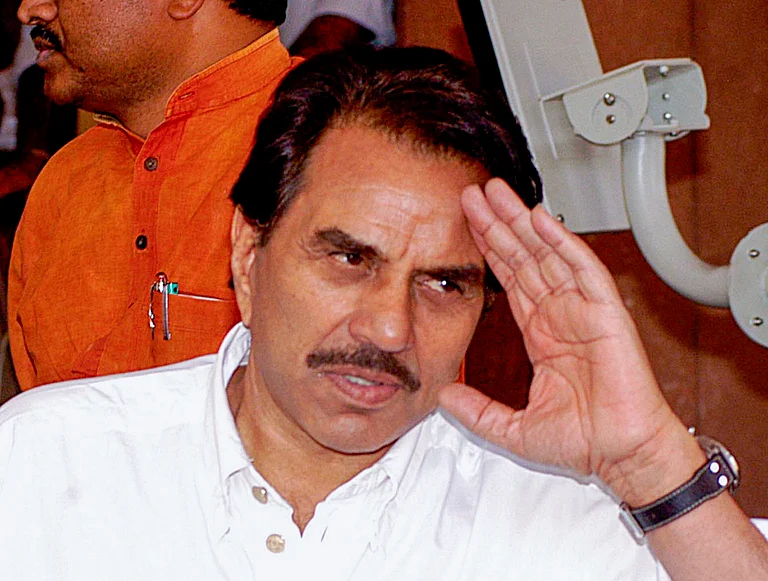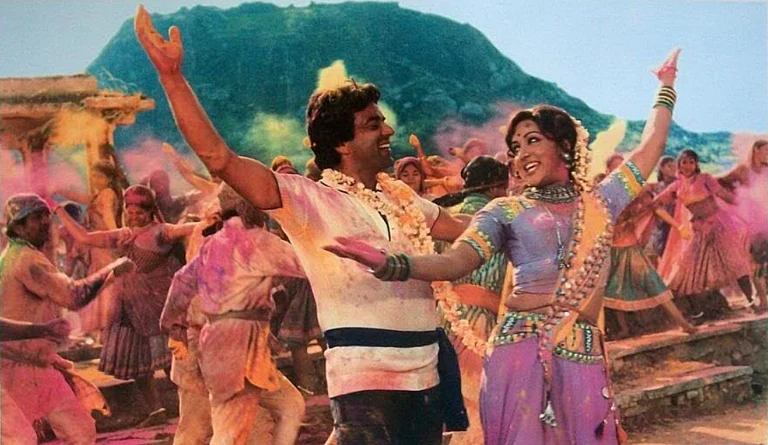Legendary Bollywood actor Dharmendra breathed his last on November 24 at the age of 89.
According to Rajiv Vijayakar's biography, his role in Hrishikesh Mukherjee's Satyakam was among his own favourites.
His acting style was original and grounded; he never imitated other actors to emote in his roles.
Book Excerpt | Dharmendra: Not Just A He-Man By Rajiv Vijayakar
Rajiv Vijayakar's 2018 biography, published by Rupa Publications, is an exhaustive account of the stalwart's life that looks even at those aspects of his career that remained underplayed in the public eye.
Excerpted from ‘Dharmendra: Not just a He-Man' with permission from Rupa Publications.
The Unrewarded Actor
Dharmendra’s favourite among his own films is Hrishikesh Mukherjee’s Satyakam, especially because of the climax. He reminisced, ‘My character was suffering from cancer and had lost his ability to talk. I had to convey Satyapriya’s anguish wordlessly, through my eyes only. At some point, my grandfather and spiritual guru, portrayed by Dadamoni (Ashok Kumar) walks into my room and tells me, “Now I can berate you to my heart’s content without any retaliation from you.” The words are bitter but they convey his love for me. I had to express I understood what my guru was saying, and that it was out of sheer love [that] he was admonishing me.’
He went on, ‘Next [in the film], my wife, Sharmila Tagore, who has been a silent witness to my uncompromising life, walks into the room with incriminating papers for me to sign that could relieve my family of poverty. For the sake of my wife and son, I agree to sign the papers. But before I can actually do it, Sharmila snatches the papers out of my hand and tears them. My character had to convey his deep, undying love and gratitude for the woman who has stood by his side, through thick and thin. It was a very tough scene to do. I thank Hrishida for the faith he reposed in me.’
About his own favourite performances, apart from Satyakam, Dharam said, ‘Main badi baat nahin karna chahta (I don’t want to talk big), but I loved my performance in Seeta Aur Geeta—it was a small role but [it] had soul, and there were interesting nuances, like the way I light my cigarette. I loved my work in Hathyar and Ghazab too.’ In later interviews, he added Pratiggya to the list as well.
At the same time, the discrimination hurt. It was not just popularity that was the index here. As Abrar Alvi had told Guru Dutt, ‘The boy is an original, he does not copy anybody’—and this virtue was just the starting-point. ‘I never copied any star,’ Dharmendra admitted. ‘I changed my personality to the character, but no script was changed for me. If I had to weep, I would go back to the memory of a childhood tragedy. When it flashed before me, I would cry without glycerine.’
Thus, the malleable (as Alvi had predicted) Dharmendra could fit into any role, and had a natural penchant for comedy and romance, besides action and drama. Though his dancing skills were never great, he would serve the purpose in the few dance numbers that he did in his career. Emotions were his mainstay.
In a sense, he became and remained a complete actor.
Ironically, indeed, Dharmendra, as we have mentioned before, was only appreciated for ‘underplaying’ his roles, beginning with his early films Bandini and Anupama and even later in Satyakam, Naya Zamana, Dost and a few others. But when we observe his mindboggling variety in comedy in films like Seeta Aur Geeta, Sholay, Pratiggya, Chupke Chupke, Ghazab and Yamla Pagla Deewana and the intensity of his work in Ayee Milan Ki Bela, Phool Aur Patthar, Jeevan Mrityu, Mera Gaon Mera Desh, Samadhi, Loafer, Yaadon Ki Baaraat, Aas Paas, Krodhi, Ghulami, Hathyar, Apne and others, we are indeed flummoxed that a man with such a range and capacity was never considered worthy of being among the elite acting league of Hindi film personalities.
‘Obviously his connect with audience was his greatest strength!’ J.P. Dutta told me. ‘He had this animal presence. You see, it’s very simple. It’s all about a presence you cannot explain.’
Dutta explains the actor’s dedication. ‘He was a natural actor, and because I could mould him the way I wanted, there was a comfort level. Dharam understood what he had to do, what he had to become! He reminded me of the legendary veteran actor Kanhaiyalal (Chaturvedi). If a producer went to him, he would be succinct after being told what his character would be. How much would he be paid, Kanhaiyalalji would ask. Of course, in this matter Dharam was the opposite, but you get the point: He was not interested in a detailed narration, as long as he knew that he was going to play, like say, the heroine’s father. Then Kanhaiyalal would say, “Bas aur nahin sunna, ladki ka baap hoon na (I am the girl’s father, right? That’s all I want to know)!”’
And Dutta explained, ‘Do you understand the psyche? Main kar kya rahaa hoon (what am I doing in the story) was the most important. He would internalize, even for a character with which he was not familiar. We are all products of our experiences and he would draw from the experiences of his life. We can only throw out what we have gone through and taken in.’
Concluded Dutta, ‘Dharamji has never been given his due. And I blame the media for that! They even made fun of him—come on, there is much more to him. What an innings he has had. What a body of work. It is very special—he is very special!’



